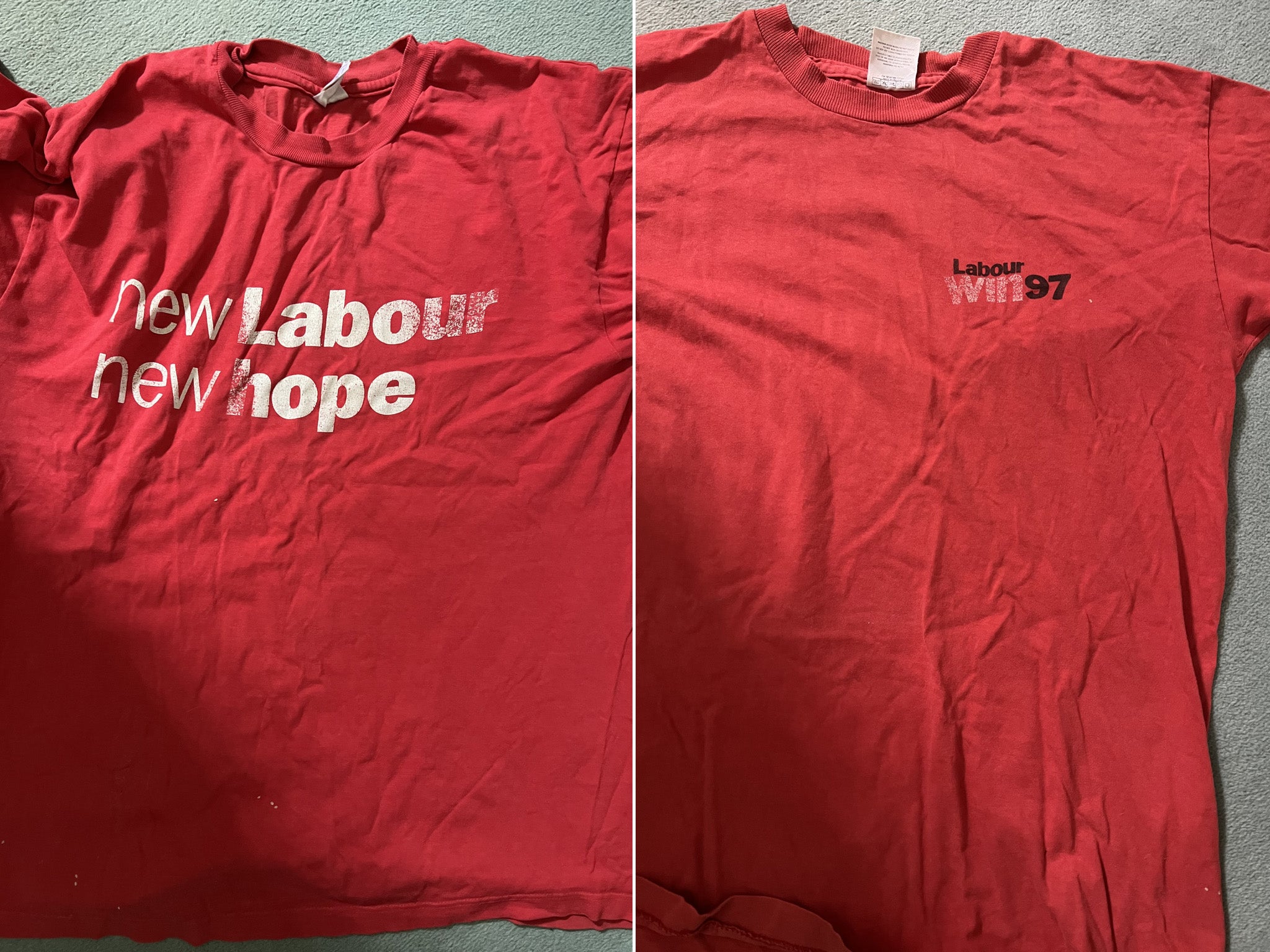New Labour risks becoming like Friends – endlessly repeated without new ideas
Labour cannot keep repeating the same policies or fights, and expecting a different result


I’ve had these T-shirts for over 25 years now. They were first thrust at me as a young activist at the 1996 conference to wear for the leader’s speech. My first ever, it was like being at a religious revival meeting – by the end we were all screaming and cheering with wild anticipation of a Labour victory and driving Thatcher’s Tories from office.
We drank in every exciting, delicious moment of hope that change was in the air. When the exit poll came in, I still couldn’t quite believe it – having been so sure in 1992 that we would win I had learned to hold my breath. Only when discussion turned to whether Billericay would go Labour did I find a phone box, ring my mum weeping with joy, and stagger home. No immediate WhatsApp deliberations and commiserations for us – finding out what was happening was a much more longwinded and complicated process.
Like my grandma telling me of the Second World War and silk parachutes and rationing, I still recount to young campaigners those heady days when a Labour prime minister pledged to end child poverty and meant it. I don’t need replica merchandise, or to hear “Things Can Only Get Better” – a song most of us eschewed for a schmaltzy rewrite of “Three Lions” – because as an overeager volunteer, I had the honour of making tea for actual Labour cabinet members at conferences. This being because catering and doing events, rather than being policy strategists, were the roles deemed acceptable for women in our movement then – and still too often now.
I also know we fetishise or mythologise New Labour at our peril. Our capacity to learn from our history that change is possible must not be at the expense of our understanding that this success was of its time – and that if we are to win again we must be of this time, this era, in both word and deed. Replicating New Labour in tone or content or even style, however tempting, will not win the next election because the world has changed so much, and so too have the public.

While in office Tony Blair never sent a single email. Now social media has created jobs, ripped up basic democratic truths and changed how we as humans interact beyond all recognition. Back then there was still trust that politicians had red lines; John Major may have faced the Cash for Questions affair and Neil Hamilton, but no one doubted his intrinsic decency. Now we have Boris Johnson and the casual use of dead-cat distractions corroding any potential goodwill towards all sides. In 1997 there were a million people on waiting lists – saving the NHS was primarily about money. Today, repeating “NHS, NHS” at people makes little sense in a world when funding is pledged on all sides of politics, and we must reform our health and social care services.
Having driven most infectious diseases out of our nation by creating a national health service, the new health inequality is about keeping people out of hospital altogether, and keeping them physically and mentally well. New Labour led efforts for multilateral disarmament. Now Brexit, terrorism, dictators and the climate emergency mean that internationalism will require more international structures and citizen movements, not less, for sharing risk.
It is not just because the world is different that New Labour should be seen for its past successes rather than as a contemporary playbook.
Twenty-five years ago government from the centre was plausible. But that didn’t make it a good idea then, nor a good idea now. That means recognising, whether Iraq, PFI or the New Deal, New Labour’s engagement with the public to understand the impact of their decisions fell short to grievous effect. Twenty-five years on, it is now even more apparent that government cannot be done at a distance from the public; whether education, social care, the impact of the cost-of-living crisis or cutting carbon emissions, the public must be partners not clients if a policy is to work.
That requires a radical rethink not just of what we offer people, but also how we do it. Ironically, the value of winning arguments for new ideas and new ways of working is the one lesson from New Labour that is never discussed. New Labour didn’t just listen – offering action on crime or anti-social behaviour to reflect focus groups – it also led.
In the 1990s, few discussed or thought a minimum wage or an end to child poverty were plausible, but New Labour spoke out for them anyway. Now, as people ponder red and blue walls, talk of message discipline and obsess about viral reach, there is a danger we forget good oppositions become brilliant alternatives when they make the political weather and don’t just seek to ride a storm.
The collapse of Sure Start, the abandonment of child trust vouchers and the instability in Northern Ireland shows how quickly progressive success can be discarded without advocates.
To keep up to speed with all the latest opinions and comment, sign up to our free weekly Voices Dispatches newsletter by clicking here
As many still obsess about New Labour, it risks becoming the political equivalent of Friends: endlessly replayed as new generations pick apart what was right and wrong while failing to produce new ideas. I keep those dog-eared T-shirts as a reminder of what is possible, and a warning never to assume that we have the answers – or even that we understand the problem.
Labour cannot keep repeating the same policies or fights over and over again expecting a different result. Every generation must accept the bitter truth that securing real radical change requires sustained re-imagination, effort and engagement in and out of office – which is much harder work than chewing over old glories. Twenty-five years later the T-shirts may be faded but my determination to be part of that process of renewal, revision and radicalism is as strong as ever.
Stella Creasy is MP for the London constituency of Walthamstow

Join our commenting forum
Join thought-provoking conversations, follow other Independent readers and see their replies